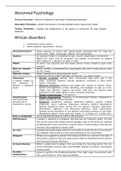Summary
Summary PYC3702 Abnormal Behaviour and Mental Health - study notes
- Institution
- University Of South Africa (Unisa)
Study notes made in preparation for the exam for PYC3702 Abnormal Behaviour and Mental Health. To be used in conjunction with the approved study guide.
[Show more]



